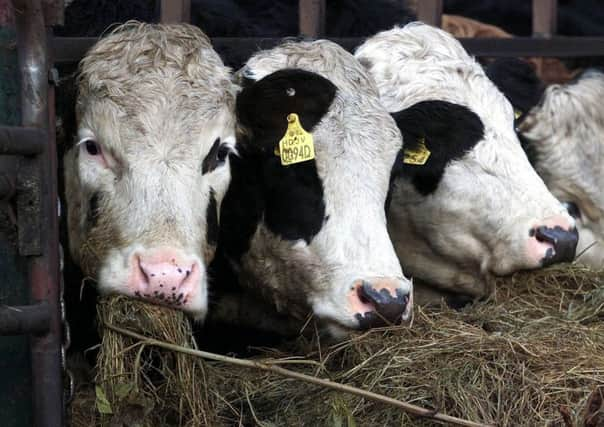BSE farm in lockdown as extra cows culled


The case of so-called mad cow disease, known in full as Bovine Spongiform Encephalopathy, was identified at the unnamed farm during routine testing of fallen stock over four years of age.
A movement ban is in place at the farm while investigators seek the source of the fatal disease.
Advertisement
Hide AdAdvertisement
Hide AdChief veterinary officer Sheila Voas said up to four of the farm’s other cows will be slaughtered, with brain stem samples taken from them and tested for BSE.
She said: “The animal itself is dead, she died before she was tested, and there are three other animals, or possibly four, that will need to be slaughtered purely from a precautionary basis.”
Ms Voas believes the disease occurred spontaneously in the affected animal, but said it could be months before this is confirmed.
“All the information we have is this is under control, there’s no reason for people to panic,” she said. “It’s not the start of an outbreak, it’s a single isolated case that won’t affect the food chain.”
Advertisement
Hide AdAdvertisement
Hide AdOfficials have stressed the case poses no risk to humans and its discovery proves surveillance systems are working effectively.
Sue Hayman, Westminster’s Shadow Secretary for Environment, Food and Rural Affairs, is seeking further assurances from opposite number Michael Gove, asking in a letter if increased testing of herds in England is being considered, but that move would be an overreaction, said Chris Mallon, director of the National Beef Association, who added: “We are robust enough as an industry. What this case shows is the need for surveillance to continue.”
Scottish Rural Economy Secretary Fergus Ewing has initiated a government response plan to protect the farming industry.
He said: “While it’s important to stress that this is standard procedure until we have a clear understanding of the disease’s origin, this is further proof that our surveillance system for detecting this type of disease is working.”
FIRST CASE FOR YEARS
Advertisement
Hide AdAdvertisement
Hide AdMillions of cattle were culled in the UK in the 1990s during a BSE epidemic.
It can be passed on to humans in the food chain, causing a fatal condition called variant Creutzfeldt-Jakob disease (vCJD).
Strict controls were introduced to protect consumers after the link was established in 1996.
The disease has been reduced to a handful of cases each year in the UK, with the last recorded case in Wales in 2015. Prior to the discovery of the latest case, Scotland had been BSE free since 2009.
Food Standards Scotland said strict controls remain in place to protect consumers from BSE risk.